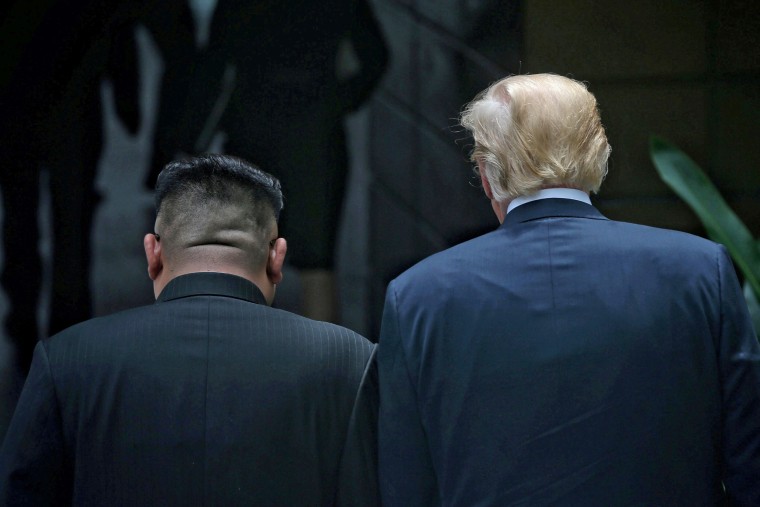SINGAPORE — Over the past week, President Donald Trump alienated allies and cut a deal with a brutal dictator.
He praised North Korea’s Kim Jong Un as “honest, direct and productive” and lambasted Canadian Prime Minister Justin Trudeau as “dishonest.”
For critics, Trump’s moves are confounding and perilous evidence of incoherence. For his allies, they’re a reminder of his no-apologies approach to foreign policy.
For everyone, it's a reminder that the Trump Doctrine, as one senior White House official told the Atlantic's Jeffrey Goldberg, is "We're America, Bitch."
But Trump has also increasingly shown an affinity for the idea that he can mend tattered relationships — particularly the ones he’s torn asunder himself.
Just months ago, he was threatening to unleash “fire and fury” on Kim and calling the North Korean autocrat “little rocket man.”
Now, he’s telling the world that Kim is a credible partner in peace talks.
“As history has proven over and over again, adversaries can become friends,” Trump said at a news conference here Tuesday.
And Trump, who publicly muses about winning a Nobel Peace Prize, surely knows he can’t make peace with nations who are already friends.
Instead, he’s appeared somewhat obsessed with the idea that he can forge new bonds with adversaries in North Korea, China and Russia.
While China’s Xi Jinping and Russia’s Vladimir Putin don’t need Trump’s assistance to grab international attention, Kim can use the help.
Wendy Sherman, a senior State Department official in the Obama administration, said on MSNBC Tuesday that the meeting between Trump and Kim was a good thing but that it was also startling because of the parity afforded Kim.
“I was a little taken aback by the North Korean flags and the American flags side by side,” Sherman said. “We really aren’t side by side. We aren’t equals to each other, and this conferred power to Kim Jong Un that I don’t believe he has yet earned in terms of the respect from the United States.”
As for American allies, Trump said he’s confident that disputes with Canada and European Union countries over trade can be resolved easily, with the clear assumption that he’s got a little more leeway with countries that have been in league with the U.S. for years.
Either way, he won’t get much credit for making friends with existing allies. From that standpoint, he’s much better off repairing bad relationships or turning good ones sour enough that he can win plaudits for reconciling.
He said Tuesday that he may someday try to negotiate a new nuclear nonproliferation deal with Iran — the same Iran he slapped sanctions on earlier this year in defiance of a nuclear pact reached by Tehran, the Obama administration and several other nations.
By backing out of that agreement and reimposing tough sanctions on the Iranian regime, Trump may believe he can make Tehran desperate enough to return to the bargaining table.
Trump’s critics said his behavior with Iran made it more difficult to negotiate with Kim. So far, that doesn’t appear to be the case. The same president who refused to sign on to the G-7 joint statement with America's closest allies signed on to an agreement with North Korea's autocratic leader just days later.
And Trump easily acknowledged the awkward split screen of the U.S. fighting its friends and playing nice with a despot who has long been under American sanctions.
“What do you say to America’s allies that worry you are jeopardizing our longtime alliances and worry you are treating our historic friends and enemies and our historic enemies as friends?” he was asked at the news conference Tuesday.
“That’s a very fair question,” he replied.
